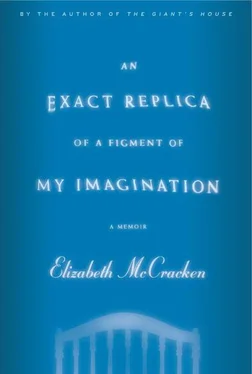“I think your name is Gus,” I told him, and of course now I can’t imagine why we thought his name could ever be anything else.
Later that week, after we’d come home from the hospital, the baby clothes arrived from England. We’d thrown away anything really difficult, or burned it behind Savary. Still, for a while I just stood and looked at open boxes. Then I took out a piece of clothing, a pair of blue striped pull-on pants, and without thinking I brought them to my face and breathed in.
Of course they wouldn’t smell like him. He died in Bordeaux. What sentimental perfume did I think I’d find on them anyhow, what essence of Puddingness?
And yet they did smell of him. That is, they smelled of the sweet milky French baby soap we’d bought in Duras. Savary had a washing machine but not a dryer, and we’d washed everything and then hung it to dry on the lines on the south side of the terrace. Those lines were way over my head — I had to stand on tiptoe and grab them down — and the clothes were very small and sweet as they dried. So the pants and everything in the box did smell like Pudding, that is, they smelled of our last optimistic days at the house as we did the last bits of nest feathering before we brought our son home. I’d forgotten the smell (as you do of a lost person), but now here it was, three boxes full.
I found that my heart could take it, and I started to unpack. At first every now and then I’d get a flutter and think, I remember when I bought this for him, and then I’d look at the label inside — Baby Gap or Old Navy or Carter’s — and would realize it was a hand-me-down from the little American boy in Cambridge. A few articles of clothing felt very sad to me, items of clothing so charming and peculiar that they’d been part of the story we’d told ourselves, “Our Life with Pudding”: some particularly stylish clothing that my friend Monica had sent to us, the tiny pair of plaid wool knee pants that I’d bought in Bergerac for two euros. We’d often looked at this clothing when I’d been pregnant, and hurriedly packed it up when we’d returned from the hospital. We put away the sweaters that Edward’s mother had made, because they had been made particularly for Pudding. They’re his, and his alone.
But even the most fraught of the other clothing feels fine now. Of course it reminds us of Pudding, but when have we ever forgotten? Indeed, we want to remember him, and it doesn’t feel strange or grim to put Gus into a pair of pants that we’d imagined Pudding wearing. People wear clothing that belonged to their dead all the time: a father’s Irish sweater, a grandfather’s felt hat, a grandmother’s Peter Pan — collared shirt. I can look at those plaid pants and remember, for once, not Pudding’s death, but the pleasure I took in finding them for sale, for so cheap, how funny I thought those plaid pants would look on a little boy.
And now I’m thinking of that Florida lady again, the one who wanted a book about the lighter side of a child’s death, and I know: all she wanted was permission to remember her child with pleasure instead of grief. To remember that he was dead, but to remember him without pain: he’s dead but of course she still loves him, and that love isn’t morbid or bloodstained or unsightly, it doesn’t need to be shoved away.
It isn’t so much to ask.
When I was pregnant with Gus, toward the end especially, there was nothing in my life that was not bittersweet. Every piece of hope was tinged with sadness; every moment of relief was lit on the edges with worry. But now that Gus is Stateside, my love for him is just plain love, just plain sweet. He’s such a beautiful funny thing, entirely himself, innocent of history. “It’s you!” I say to him. “All that time, it was you! Who’d ’a thunk it?”
Of course he doesn’t erase his older brother’s death. He’s a little baby: we’d never ask him to do such a job. Monkeying in the ways of the dead is for reincarnated llamas, or infant queens, not our child. His job is to be Gus. In this he more than pulls his weight.
He has cured me, mostly, of blame and what might have been, all of that fairy-tale bargaining: what would you do differently and what if . I know my fairy tales. Those bargains are disastrous: you ask for what you want, and then your words get twisted. Terrible things happen. It’s never so easy as a wish. Sometimes I think I’m ready. Whoever shows up, some cerulean fairy, some adenoidal troll, the magic goddamn galoshes, I will have a knife to its neck in a second. I will say: All my children, healthy, normal, nothing else. No? You won’t do it? Then leave me alone.
But generally my door is barred to all bargaining apparitions. Sometimes I look at Gus, and it all feels very familiar. Not him . He was a skinny just-born, with cheekbones and an incensed cry: he looked like an old man who’d been outfitted with hands and feet a size too big and he wanted to know to which knucklehead he should address his complaint. Now he is fat and looks like a retired advertising executive. He is gorgeous and inscrutable. I tell you, I’ve never seen his like.
But taking care of him, changing him, nursing him, I felt as though I’d done it before, as though it were true: time did split in half, and in some back alley of the universe I took care of Pudding, when he was a tiny baby, and this reminds me of that. There’s a strange museum/gift shop/antique store/tourist trap in Schuylerville, New York, the next town over. In front is a reconstruction of colonial Fort George done in wood cutouts — a soldier in stocks, Revolutionary soldiers in profile, all cut with a jigsaw and painted in bright colors. In front is a sign that says: An exact replica of a figment of my imagination, and that is what this life feels like some days. It’s a happy life, but someone is missing. It’s a happy life, and someone is missing.
It’s a happy life —
— Saratoga Springs, New York
June 2007
Henry Dunow, my friend and agent, read the manuscript in its earliest state, and was — as he has been for the nearly twenty years I have known him — so smart and kind I cannot describe it, nor adequately thank him for it.
I also want to thank Paul Lisicky, whose reading made all the difference to me (and whose friendship likewise does); Ann Patchett, of course and as usual; Wendy Owen; and Betsy Lerner.
More thanks to: Reagan Arthur, Oliver Haslegrave, Jayne Yaffe Kamp, and everyone at Little, Brown.
I hope my gratitude for everything else and to everyone else is legible in the pages of this book.
Elizabeth McCracken is the author of The Giant’s House, which was nominated for the National Book Award; Niagara Falls All Over Again, winner of the PEN/Winship Award; and Here’s Your Hat What’s Your Hurry, a collection of stories. She has received grants and awards from the Fine Arts Work Center in Provincetown, the National Endowment for the Arts, the American Academy of Arts and Letters, the Guggenheim Foundation, and the American Academy in Berlin.












